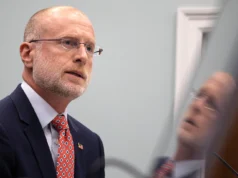
The Federal Trade Commission on Wednesday said it is examining the role that drug wholesalers and companies that purchase medicines for U.S. health-care providers play in shortages of generic drugs, which account for the majority of Americans’ prescriptions.
The move follows an unprecedented shortfall of crucial medicine ranging from injectable cancer therapies to generics, or cheaper versions of brand-name medicines, over the last year, which has forced hospitals and patients to ration drugs. Problems from manufacturing quality control to demand surges can drive supply issues.
But the Biden administration is zeroing in on other players in the drug supply chain to uncover the “root causes and potential solutions” to ongoing shortages.
In a joint request for information, the FTC and the Department of Health and Human Services are seeking public comment on the contracting practices, market concentration and compensation of two types of middlemen. They are group purchasing organizations, which broker drug purchases for hospitals and other health-care providers, and drug wholesalers, which buy medicines from manufacturers and distribute them to providers.
The request for information will examine whether those middlemen have misused their market power to cut the prices of generic drugs to the point that manufacturers can’t profit and have to stop production, and rival suppliers are discouraged from competing in the generic drug market.
“The FTC is interested in looking at this market because on one side of the market, you have patients that are desperate for the right drug and would pay a very high price for that drug if they could. And on the other side of the market, you have manufacturers that can’t get more than a few dollars per dose of that same drug,” Doug Farrar, director of the FTC’s Office of Public Affairs, told CNBC.
“So that negative outcome for patients is what caused the FTC to want to study this market,” he added.
The public will have 60 days to submit comments at Regulations.gov, the FTC said.
Group purchasing organizations and wholesalers have gotten limited attention on Capitol Hill, even as reining in high drug costs has become a key priority among lawmakers in both chambers.
As part of the effort to cut the cost of medications, lawmakers have sought greater transparency from pharmacy benefit managers, which negotiate drug discounts on behalf of insurance companies and other payors, about their business practices.
PBMs contend that manufacturers are responsible for high drug prices, while drugmakers say rebates and fees collected by those middlemen force them to increase list prices for products.
Disclaimer
The information contained in South Florida Reporter is for general information purposes only.
The South Florida Reporter assumes no responsibility for errors or omissions in the contents of the Service.
In no event shall the South Florida Reporter be liable for any special, direct, indirect, consequential, or incidental damages or any damages whatsoever, whether in an action of contract, negligence or other tort, arising out of or in connection with the use of the Service or the contents of the Service. The Company reserves the right to make additions, deletions, or modifications to the contents of the Service at any time without prior notice.
The Company does not warrant that the Service is free of viruses or other harmful components
This article originally appeared here and was republished with permission.












